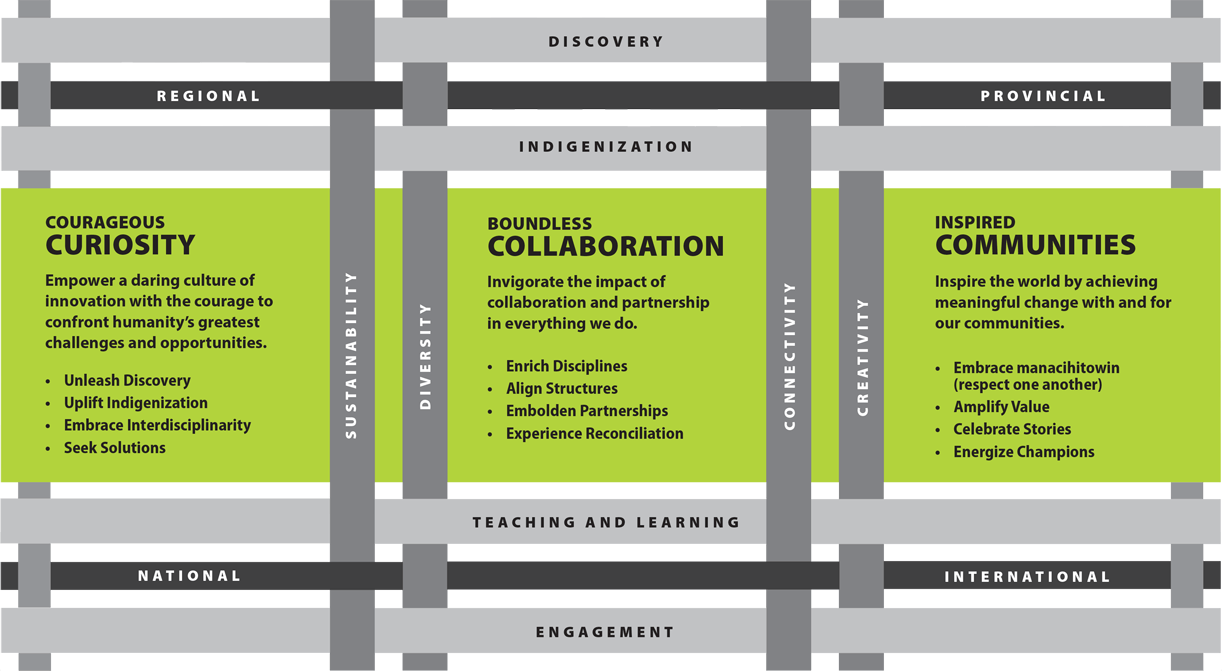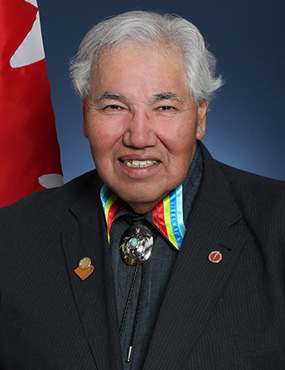Reconciliation, Decolonization, Inclusion
Our Strategic Framework: "The Weave"

National Day for Truth and Reconciliation
The University of Saskatchewan’s decision to observe this new holiday is consistent with the university’s national efforts toward reconciliation.
The university will remain closed this day so students, staff, and faculty can reflect on and participate in this integral day.
Embrace manacihitowin
Strengthen bonds of respect, trust, and shared benefit with Indigenous communities in Saskatchewan, across Canada, and globally.
Strong relationships are built upon respect, reciprocity, and continuous renewal of values and actions that support healthy connections. The English interpretation of this Cree/Michif phrase is “let us respect each other." This phrase embodies humility and speaks to the spirit of the treaties. It is an invitation to walk alongside, to travel down a path, working together to realize goals and a vision that strengthen all cultures.
The University of Saskatchewan embraces the teachings of manacihitowin, which are drawn from the stories and songs of Elders and Traditional Knowledge Keepers.
Deep understanding of concepts like manacihitowin demands experiential cultural and language learning, and an inquisitive learning spirit. We cannot achieve respectful relations passively; as a university, we have both an ethical obligation and a vital opportunity to nurture the sharing of stories that will awaken understanding and inspire our community toward relationships uplifted by our histories, cultures, and lived experiences: manacihitowin.
GUIDEPOSTS
- Increased number of experiential cultural and language opportunities for all students, staff, faculty, and leadership
- Policies and protocol that are respectful of the diverse Indigenous cultural groups in colleges and schools
- Systems and structures that support collaborative and reciprocal relationships and partnerships with Indigenous peoples on- and off-campus
- Policies and practices that honour Elders, Traditional Knowledge Keepers, and Language Teachers
- The articulation and teachings of manacihitowin will be fluid and deeply known and evident throughout the whole campus community
Leading through influence, the Vice-Provost, Indigenous Engagement provides inspirational, transformational, and visionary leadership for the Indigenous academic portfolio at the University of Saskatchewan.
By leading the development and implementation of a university-wide Indigenous strategy, the Office of the Vice-Provost, Indigenous Engagement works with existing portfolios and structures across the university, and creates new structures and processes to implement the university’s indigenous-focused goals.
The office of the Vice-Provost, Indigenous Engagement provides strategic guidance to the constellation of people and units involved in Indigenous academic initiatives, serves as a key resource for senior leaders, and leads consciousness-raising to challenge and overcome institutional and systemic barriers to the successful attainment of post-secondary education for Indigenous students.
Experience Reconciliation
“Reconciliation,” said Senator Murray Sinclair, Chair of the Truth and Reconciliation Commission, “is about forging and maintaining respectful relationships. There are no shortcuts.”
As a community, we have a shared responsibility to honour and join in the journey of reconciliation. Relationships have been fractured; they require repair, redress, and healing. The tragedy of residential schooling exploited education as a tool to destroy identity. As a learning institution, the university has an obligation to use its influence to celebrate diversity and bring to the forefront the strength and beauty evident in Indigenous thought: to move forward “in a good way."
The Truth and Reconciliation Commission has also taught us that reconciliation is a goal that may take generations to realize. The University of Saskatchewan understands that reconciliation is an enduring journey, and we are steadfastly committed to actions that contribute to respectfully enabling the balance of relationships between Indigenous and non-Indigenous peoples. Enabling this balance requires us to nurture an ethical space in which we can explore how we relate to each other through the lenses of history, culture, and lived experience. By providing opportunities to bring people together to share their experiences of truth, we will contribute to individual and collective healing and nourish deeper expressions of reconciliation.
GUIDEPOSTS
- Growth in the number, diversity, and strength of reconciliation programming across colleges and schools
- Recognized leadership in reconciliation models, initiatives, and methodologies
- Systems and structures that support reconciliation
- Local, provincial, national, and international recognition for the strong stance on reconciliation and for meaningful reconciliation initiatives
- Strong evidence of initiatives that are responsive to the TRC Calls to Action
- https://plan.usask.ca/boundless-collaboration.php
Uplift Indigenization
Expand the understanding and practice of Indigenous ways of knowing and concepts of innovation.
Together, we are uplifting Indigenization to a place of prominence at the University of Saskatchewan. Words and phrases that capture the importance of Indigenous peoples and their ways of being, knowing, and doing—philosophies, languages, methodologies, pedagogies—are evident throughout the University Plan and are a source of inspiration for our students, faculty, staff, and community partners.
Indigenization challenges us to amplify the forces of decolonization. Decolonization practices contest divisive and demeaning actions, policies, programming, and frameworks. Indigenization is the healing, balancing force; it calls us to action, invites a rebalancing of relationships, inspires opportunities for mutual cultural understanding, and helps us to find comfort in the discomfort decolonization can entail. From an Indigenous perspective, the gesture of uplifting (open hands, palms up, raised arms) conveys value, openness, honour, trust, and relationship. By uplifting Indigenization and Indigenous self-determination, we are welcoming ideas, knowledges, and perspectives that enrich us all.
Indigenization strengthens the fabric of the university. It involves the respectful, meaningful, ethical weaving of First Nations, Métis, and Inuit knowledges, lived experiences, worldviews, and stories into teaching, learning, and research. Indigenization is a gift that benefits every member of our community.
GUIDEPOSTS
- Growth in the number of Indigenous policies, programmes, curricula, and initiatives across colleges and schools developed with and validated by Indigenous peoples
- Recognized Indigenous leadership at all levels of the academy, administration, and governance
- Amplified Indigenous student, faculty and staff recruitment and retention efforts
- Systems and structures—including tenure, promotion, and merit practices—that support and recognize Indigenization
- A university community—Indigenous and non-Indigenous—increasingly empowered by active and ongoing system-wide learning that supports the growth and sustainability of Indigenization
- Local, provincial, national, and international recognition as leaders of Indigenization and decolonization
Resources
- Truth and Reconciliation Commission of Canada: Calls to Action
- Educational resources from the National Centre for Truth and Reconciliation
- Summary of the TRC's final report: Honouring the Truth, Reconciling for the Future
- Principles of truth and reconciliation: What We Have Learned
- The Survivors Speak
- Final report, volume 1, part 1: Canada's Residential Schools: The History, Origins to 1939
- Final report, volume 1, part 2: Canada's Residential Schools: The History, 1939 to 2000
- Final report, volume 2: Canada's Residential Schools: The Inuit and Northern Experience
- Final report, volume 3: Canada's Residential Schools: The Métis Experience
- Final report, volume 4: Canada's Residential Schools: Missing Children and Unmarked Burials
- Final report, volume 5: Canada's Residential Schools: The Legacy
- Final report, volume 6: Canada's Residential Schools: Reconciliation


